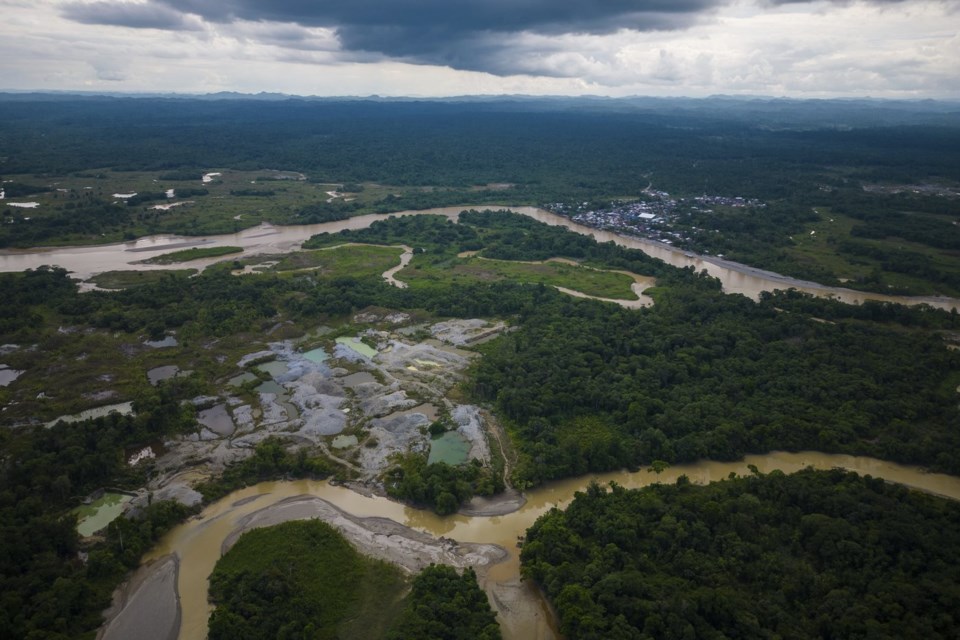BOGOTA, Colombia (AP) — Assets worth over $64 million were seized and 94 people arrested as part of a multinational law enforcement operation targeting environmental crime in the Amazon Basin.
The crackdown, coordinated by the United Arab Emirates, has struck a major blow to transnational environmental crime networks, officials said.
The campaign, which ran from June 23 to July 6, mobilized more than 1,500 officers from Brazil, Colombia, Ecuador and Peru. Authorities conducted over 350 coordinated raids targeting illegal mining, wildlife trafficking, logging and fuel smuggling across some of the Amazon’s most remote and ecologically sensitive regions.
Dubbed Operation Green Shield, the crackdown was coordinated by the UAE's Ministry of Interior through the International Initiative of Law Enforcement for Climate (I2LEC), a platform launched in 2023 to support climate-related policing. A central command center was established in Colombia’s capital, Bogota, with real-time data sharing, officials said.
“Environmental crime displaces communities, fuels violence against women and children, and erodes cultural heritage. These are not just crimes against nature — they are crimes against people,” Lt. Col. Dana Humaid, Director-General of the International Affairs Bureau at the UAE Ministry of Interior and Coordinator of I2LEC, told The Associated Press in a call.
Humaid said countries worked closely to set shared priorities, ensuring the operation aligned with both national objectives and broader international goals.
¨That’s what made it different — it wasn’t top-down, it was a joint design and execution,” she said.
Trafficking endangered species
Among the seizures were more than 310 tons of raw minerals, 3,800 cubic meters of timber, 39,000 gallons of smuggled fuel, and 530 pieces of equipment, including trucks and bulldozers.
Authorities also recovered more than 2,100 live animals and 6,350 dead specimens — including birds, reptiles, and mammals — that were being trafficked through illegal wildlife networks.
Raids and arrests took place simultaneously across a wide stretch of the Amazon, including Sarare Indigenous Land in Brazil’s Mato Grosso state, home to the Nambikwara people, and El Cenepa Province in Peru’s Amazonas region, where the Kumpanam Indigenous community resides, authorities said.
In Brazil, authorities also deployed teams in Amapa state. In Colombia, operations were carried out in at least 22 departments, including Putumayo, Guaviare, Choco, Antioquia and Vichada. In Ecuador, law enforcement activity spanned dozens of locations from Carchi Province, home to the Awa Indigenous people, to Loja, Zamora, Santo Domingo and other provinces.
One of the largest wildlife rescues occurred in Peru, where police recovered 1,400 live animals and dismantled a group known as Los Depredadores del Oriente, accused of trafficking endangered species. In Colombia, authorities said they disrupted three criminal groups and took down a cell allegedly linked to the Clan del Golfo, a powerful organized crime syndicate.
'We achieved real progress'
Humaid said the operation demonstrated how international cooperation can be used to confront environmental crime and that in previous operations, like in the Congo Basin, it was a heritage issue.
¨In the Amazon, we’re seeing the same thing — these crimes directly impact Indigenous communities, their land, their livelihoods, and their identity.¨
The use of satellite-based geolocation tools allowed teams to coordinate across borders and monitor operations in real time, enabling what officials called one of the most synchronized environmental enforcement actions in the region to date.
Colombian authorities described the operation as part of a broader national and international strategy.
“We achieved real progress against illegal mining, fuel theft, and wildlife trafficking,” said Col. Jorge Andres Bernal Granada, director of environmental protection at Colombia’s National Police.
Ecuador’s Deputy Police Commander Fausto Iñiguez Sotomayor called the country’s first participation in an I2LEC-led operation a “critical step,” while Gen. Manuel Elías Lozada Morales of Peru said the campaign proved that countries “can effectively protect one of the most important ecosystems on the planet.”
Renato Madsen Arruda, Brazil’s federal coordinator for Amazon and environmental protection, said the work disrupted illegal gold mining operations in hard-to-reach areas.
Officials said further arrests and seizures are likely as follow-up investigations continue.
— Follow Steven Grattan on Instagram: @steven.grattan
— The Associated Press’ climate and environmental coverage receives financial support from multiple private foundations. AP is solely responsible for all content. Find AP’s standards for working with philanthropies, a list of supporters and funded coverage areas at AP.org.
Steven Grattan, The Associated Press



